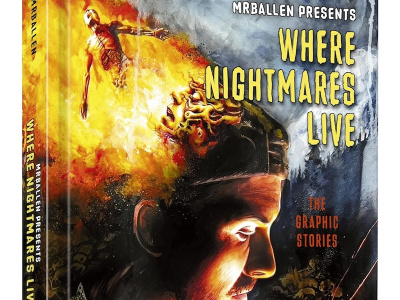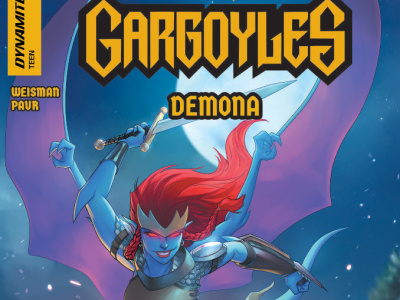 Ron Catapano of Ron's Comic World in Mount Holly, New Jersey comments on the news of DC and Marvel lowering their comic prices (see "DC Lowering Comic Prices in 2011") as well as the push for digital comics.
Ron Catapano of Ron's Comic World in Mount Holly, New Jersey comments on the news of DC and Marvel lowering their comic prices (see "DC Lowering Comic Prices in 2011") as well as the push for digital comics.Mark Waid said at the NYCC, "The single biggest obstacle to all publishers now is going digital without pissing off retailers, but they can't be beholden to a few thousand stores."
I've cleaned up what I think of this, but Mark Waid’s comment represents the same ignorance as the people that are making the decisions for this industry. I remember a segment of The Colbert Report last year where they interviewed a politician who had cut their 2009 budget by selling the county buildings for $5,000,000 and then leasing them back for $3,000,000 a year. When they were asked what they were going to do next year, they just kept repeating that they had balanced "this years budget." This is the same sort of reasoning.
Not being beholden to these few thousand stores is a large part of what is wrong with this industry. If anything, the publishers have mostly acted with little or no regard at all for comic shops. Having some consideration for these comic shops is in their own best interest. Both DC and Marvel (as well as some of the smaller publishers) have taken steps in the last few years that have directly impacted independent comic shops.
A large and consistent quantity of trade paperbacks contributed to the devaluing of back issue comics. Most shops adapted and started carrying more trade paperbacks and stocking fewer back issues. As trade paperbacks releases became more dependable, many customers stopped buying the monthly books and switched to waiting for the trade paperbacks. Again, shops adapted... then the trade paperbacks started being made more readily available to large bookstore chains and large online discounters. This helped take a lot of the "special" out of the specialty shops. My favorite personal experience was while DC was pushing the Watchmen TPB to comic shop retailers, this $19.99 book was being sold by Amazon.com for $9.99. After including shipping, I paid more than that from Diamond... I still have 2 cases of the book!
Expanding sales to these other outlets made the publishers some extra money, for a while anyway, but as sales started to level off in the other outlets, the publishers found a way to make up the difference--put the collected editions out in hardcover at a $5 or $6 higher price point. While this allowed the publishers to make more money from the bookstores (at least in the short term) this decision has severely damaged sales of trade paperbacks in comic shops.
Would it have been too much effort to offer comic shops the choice of a softcover edition at the same time as they offered the hardcover? My sales of collected editions dropped by about 80% when they changed to the higher priced hardcovers. As sales have been dropping in traditional outlets, the publishers are now trying to bypass these outlets altogether and sell their products digitally. Once again they are rushing after short-term gains without a long-term plan.
Each step of the way they have damaged their own industry and now that they have helped to drive customers away from comic shops they reduce both the price and the content as if "Oops, sorry!" will bring back all of our lost customers. While most of my customers weren't thrilled by the higher cover price, it wasn't a deal breaker as long as they felt they were getting value for their money such as a longer story or a good back up story and not just reprint pages or advertisements.
I would have preferred a middle ground, drop the price to $3.50 and keep the higher page count for the main story and drop the backup story, but then nobody asked for my opinion. The only thing this price drop is going to do is take another chunk out of my ever shrinking profit margin and maybe finish me off. If a lower price was all it took to sell comics, I'd be selling a ton of those $1 priced issues that keep coming out yet I'm usually lucky if I can sell more than a few copies.
When trying to show similar examples of what the comic industry is going through, there are many who try to compare comics (a visual medium) to music (not). Forget the music industry, let's look at something a little more current and a little more like the comic industry... DVD's. In the past several years the number of ways for people to get movies has increased. You can rent them online, you can stream them to your game system, you can rent them from your cable company, you can have them mailed to your house, you can even rent them from the vending machine at the grocery store, you can buy them online at discounted prices, or you can go out and buy them at your local big box store. The one thing most of us can't do anymore is go to your local video store and rent or buy them because they've gone out of business--just like many local comic shops are doing.
You would think that with so many convenient and often cheaper ways to get the movies that the DVD industry would be raking in the money, but quite the opposite has happened. With the loss of the local video stores, movie companies have seen a steady decline in sales/profits for DVDs. The old adage "out of sight, out of mind" holds true. Without their customers being constantly reminded about their product, nobody goes looking for it and sales drop. Without the constant reminder most people are content to just watch whatever is on TV instead of buying a steady stream of new product.
I'm not saying that new ways of making comics available are bad things by themselves, but take a lesson from the movie industry (who ironically are now running the comic industry), you make it difficult for your customers to follow if you burn your bridges behind you.
The opinions expressed in this article are solely those of the writer, and do not necessarily reflect the views of the editorial staff of ICv2.com.







